Part 1 of 2
by Phil Johnson
 he esteemed Dr. Warnock
he esteemed Dr. Warnock has made
yet another post (plus
a bonus follow-up comment) objecting to the look and feel of our polemic against some stylish doctrines and ministry philosophies which have borne notoriously rotten fruits.

Specifically, he suggests that in
last Monday's Pyro-post I ought not to have criticized Willow Creek's pragmatic, program-driven ministry philosophy without first saying something really nice and affirmative about them.
These are, of course, issues we have discussed with the good Doctor before. I was going to let it pass this time, but he e-mailed me, inviting my reply. So let's analyze Dr. Warnock's view of "discernment" a little more closely.
He insists that
"we really must be looking for the good in people, especially in those who have not denied important aspects of the Gospel." Note: in this context, Dr. Warnock is not talking about personal relationships between individual Christians; he is setting forth a principle for how we critique and interact with leaders of new movements, teachers of novel doctrines, and purveyors of new philosophies of ministry. Let's call it
Warnock's First Rule of Discernment.

In Dr. Warnock's estimation, my failure to go out of my way to say anything positive about Willow Creek
"seemed (at least to [him]) to be implying that Willow Creek has absolutely nothing to teach us."
I said nothing like that, of course, and it's a wholly unwarranted conclusion from what I
did say. It's also quite irrelevant to any point I was making.
On the other hand, let's be completely candid: Even if I
did go out of my way to catalogue everything I like about the Willow Creek model, it would indeed be a
very short list. In fact, as I ponder the question even now, I'm hard-pressed to think of anything truly
distinctive about Willow Creek's approach to ministry that I could honestly say advances the agenda of Christ's kingdom. Willow Creek's underlying philosophy is fundamentally pragmatic, not biblical. By their own admission, it is now statistically clear that their strategy does not produce authentic disciples—and therefore fails even the pragmatic test. So it's a bad ministry model even
by its own definition of what's "good." More importantly, the movement also falls short by every
biblical standard I can think of. Its influence among evangelicals for more than three decades has been seriously, consistently, and (I believe)
demonstrably bad in numerous ways.
It's about to get even worse.
So it would frankly bother my conscience to leave the impression (even inadvertently) that I think there's anything worth singling out as wholesome or beneficial or worthy of my affirmation in
that.

To illustrate: There might be many nutritious scraps of food garbage in a compost heap, but if something in you compels you to go out of your way to point them out to an undiscerning toddler, shame on you.
However, according to Dr. Warnock,
"if we fail to recognize something as being good and helpful and true, we fail in our discernment as much as if we blindly accepted everything in a naive way."
OK, but what if the thing being evaluated is really
not "good and helpful and true"? Because (and this is the crucial point where I take issue with Dr. Warnock's position)
the fact that a person or movement has commendable qualities (even lots of them) does not necessarily make the thing itself "good and helpful and true."
Let's call that
Johnson's Fifth Axiom of Common Sense.
Judas, for example, was apparently a very frugal man. Do we need to congratulate him for that every time we condemn his treachery? The Judaizers' doctrine was (as far as we know) perfectly compatible with every point of doctrine enumerated in the
Apostles' Creed, the Nicene Creed, and the Definition of Chalcedon. If you were to count all the true propositions the Judaizers affirmed regarding Christian essentials, there is little doubt that they would outweigh the false propositions in their system by a very large percentage. In fact, the Judaizers' one significant difference with Paul boiled down to a single proposition about the
ordo salutis. (They taught that good works precede rather than follow justification.)
But as Paul labored to demonstrate in Galatians, one apparently small, technical difference like that can and sometimes does make the difference between the true gospel and a different, damning, false gospel. Thus you'll never find Paul saying
anything positive about the Judaizers.
Moreover, in Galatians 2, Paul publicly rebuked Peter just for treating that false gospel like a mere misdemeanor—even though Peter himself was an apostle of Christ who completely, unconditionally, and unreservedly affirmed the true gospel. Yet Paul did not pillow his public rebuke (or even his retelling of it) in a lot of superfluous affirmations of Peter's good intentions, or his likeable personality, or his commitment to Christ, or whatever. It was a sharp and completely unqualified public rebuke—and under the circumstances, it was warranted. One's "tone" is not always the most important factor in raising a caution about false doctrine.
In short,
Warnock's First Rule of Discernment isn't biblical.

Given the enormity of the errors we are talking about in the Willow Creek philosophy, Dr. Warnock's objection to straightforward criticism of
that movement strikes me as terribly misguided and question-begging—and inconsistent with what he himself says in other contexts.
For example, is Willow Creek's commitment to
"important aspects of the Gospel" truly beyond question or criticism? I certainly don't think so. After all, they are sponsoring a major conference—unveiling their new agenda—with Brian McLaren as the keynote speaker. He is notorious for having portrayed the principle of penal substitution as "one more injustice in the cosmic equation . . . divine child abuse. You know?" There's hardly a single gospel-related doctrine that was highlighted in the Protestant Reformation that McLaren has not somehow questioned or attacked, and the atonement is central to all the others.
As a matter of fact, based on
Dr. Warnock's own steadfast (and excellent) defense of penal substitutionary atonement, I'm mystified as to why he objects to a shrill and unqualified warning about the direction Willow seems headed.
My strong suspicion is that Dr. Warnock's most basic objection to my "discernment style" has nothing whatsoever to do with any of the concerns I have raised about Willow Creek. I think the root of his real disagreement with me lies in our difference of opinion on the charismatic question. Usually, when he makes critical posts about TeamPyro, that's the central issue he brings up—and this latest dust-up is no exception.
But that's a whole different issue, and here Dr. Warnock's complaint becomes somewhat more nuanced. I want to answer that part of his argument, too, but that will have to wait for another day. So I'll be back to follow this up (Lord willing) by Friday, or as soon thereafter as possible.


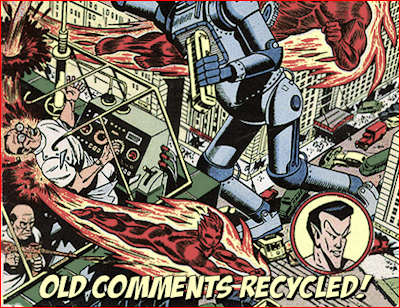




 he esteemed Dr. Warnock has made
he esteemed Dr. Warnock has made  Specifically, he suggests that in
Specifically, he suggests that in  In Dr. Warnock's estimation, my failure to go out of my way to say anything positive about Willow Creek "seemed (at least to [him]) to be implying that Willow Creek has absolutely nothing to teach us."
In Dr. Warnock's estimation, my failure to go out of my way to say anything positive about Willow Creek "seemed (at least to [him]) to be implying that Willow Creek has absolutely nothing to teach us."
 Given the enormity of the errors we are talking about in the Willow Creek philosophy, Dr. Warnock's objection to straightforward criticism of that movement strikes me as terribly misguided and question-begging—and inconsistent with what he himself says in other contexts.
Given the enormity of the errors we are talking about in the Willow Creek philosophy, Dr. Warnock's objection to straightforward criticism of that movement strikes me as terribly misguided and question-begging—and inconsistent with what he himself says in other contexts.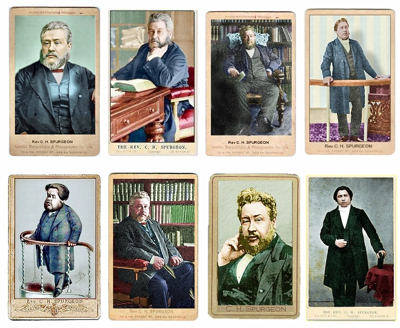
 ou did not like the trumpet, did you? . . .
ou did not like the trumpet, did you? . . . What was that to you what the trumpet was, so long as it warned you? And surely, if it had been a time of war, and you had heard a trumpet sounded to warn you of the coming of the enemy, you would not have sat still, and said, "Now I believe that is a brass trumpet, I would like to have had it made of silver." No, but the sound would have been enough for you and up you would have been to escape from the danger. And so it must be now with you. It is an idle pretense that you did not like it. You ought to have liked it. . . .
What was that to you what the trumpet was, so long as it warned you? And surely, if it had been a time of war, and you had heard a trumpet sounded to warn you of the coming of the enemy, you would not have sat still, and said, "Now I believe that is a brass trumpet, I would like to have had it made of silver." No, but the sound would have been enough for you and up you would have been to escape from the danger. And so it must be now with you. It is an idle pretense that you did not like it. You ought to have liked it. . . .

 Next, he wasn't really looking for the next big thing – wasn't chasing fads or leaving one church for another, or stopping his attendance or attending irregularly because his current church was, frankly, lame. He was faithful to the church he was joined to in spite of being more than a little disappointed in its performance.
Next, he wasn't really looking for the next big thing – wasn't chasing fads or leaving one church for another, or stopping his attendance or attending irregularly because his current church was, frankly, lame. He was faithful to the church he was joined to in spite of being more than a little disappointed in its performance.
 While we're on the topic of doing things with our churches besides complain, we have a bevy of readers in Atlanta who are about to run out of water, and we have a significant contingent in SoCal who are getting smoked out like bees.
While we're on the topic of doing things with our churches besides complain, we have a bevy of readers in Atlanta who are about to run out of water, and we have a significant contingent in SoCal who are getting smoked out like bees. Now, before you fire off an e-mail to the board of FIRE demanding that somebody take my name out of the Reformed® Lamb's book of Life™ for insulting men and women of good conscience, we have to unpack some of our contemporary assumptions about who we are and why we think the way we do. And one of "our" cultural predispositions in American evangelicalism is premillenialism, especially the kind which wears the big cardboard sign with black hand-painted letters that reads "THE END IS NEAR".
Now, before you fire off an e-mail to the board of FIRE demanding that somebody take my name out of the Reformed® Lamb's book of Life™ for insulting men and women of good conscience, we have to unpack some of our contemporary assumptions about who we are and why we think the way we do. And one of "our" cultural predispositions in American evangelicalism is premillenialism, especially the kind which wears the big cardboard sign with black hand-painted letters that reads "THE END IS NEAR". That is: we want to find a church that makes us holy and perfect rather than seeing that Christ makes us holy and calls us out to be joined together in spite of the fact that none of us are right now perfect in "the things we do to ourselves and other people" kind of way. We are not the spiritual equivalent of "Mr. Clean" -- Jesus is. He is the one who cleans the whole house and everything in it, not you or your book-laernin', and certainly not the perfection of the pastor at your church. When we get that right, we can get a lot more right in the way we act toward others.
That is: we want to find a church that makes us holy and perfect rather than seeing that Christ makes us holy and calls us out to be joined together in spite of the fact that none of us are right now perfect in "the things we do to ourselves and other people" kind of way. We are not the spiritual equivalent of "Mr. Clean" -- Jesus is. He is the one who cleans the whole house and everything in it, not you or your book-laernin', and certainly not the perfection of the pastor at your church. When we get that right, we can get a lot more right in the way we act toward others. That's not to soft-soak the warnings in the next 3 chapters: that to say that even in giving these churches strong warnings, John wasn't ready to say that individuals needed to flee the church. He was ready and able to say that it is for the truth of Christ that we must stand firm, and it is by being the church that we repudiate error.
That's not to soft-soak the warnings in the next 3 chapters: that to say that even in giving these churches strong warnings, John wasn't ready to say that individuals needed to flee the church. He was ready and able to say that it is for the truth of Christ that we must stand firm, and it is by being the church that we repudiate error. by Frank Turk
by Frank Turk
 ut of Ur has
ut of Ur has  No, thanks. Out of Ur includes a link to
No, thanks. Out of Ur includes a link to  n a similar vein, several people have pointed me to
n a similar vein, several people have pointed me to 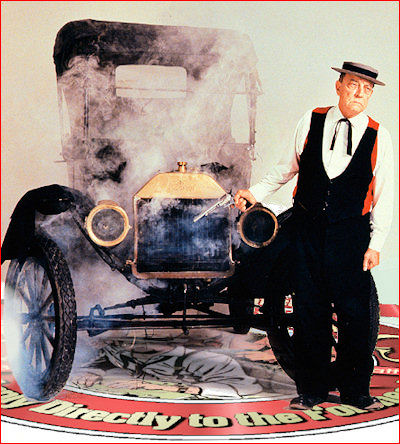
 he person of Jesus is the temple of the Godhead, and therein we behold the glory of the Father, "full of grace and truth."
he person of Jesus is the temple of the Godhead, and therein we behold the glory of the Father, "full of grace and truth."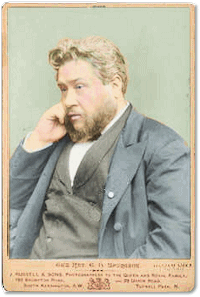 It is upon these two points that the name of Jehovah is at this time assailed—his grace and his truth. He is said to be too stern, too terrible, and therefore "modern thought" displaces the God of Abraham, Isaac, and Jacob, and sets up an effeminate deity of its own making.
It is upon these two points that the name of Jehovah is at this time assailed—his grace and his truth. He is said to be too stern, too terrible, and therefore "modern thought" displaces the God of Abraham, Isaac, and Jacob, and sets up an effeminate deity of its own making.
 ll week the blogposts here have been lighter-than usual fare. And I'm OK with that. Especially this week. I did not need a high-maintenance brouhaha in the comment-threads this week. I had several loose ends at the office to tie up, including getting the final revisions for
ll week the blogposts here have been lighter-than usual fare. And I'm OK with that. Especially this week. I did not need a high-maintenance brouhaha in the comment-threads this week. I had several loose ends at the office to tie up, including getting the final revisions for 


 arely do I put sound files on the blog, so when I do, you know it's a good one. You've got to hear this.
arely do I put sound files on the blog, so when I do, you know it's a good one. You've got to hear this. The sound clip linked below was recorded last Saturday (thanks to
The sound clip linked below was recorded last Saturday (thanks to 

 n God's word the car of truth runs on two rails of parallel statement. A great many people want to pull up one of the rails. They will not accept two sets of truth.
n God's word the car of truth runs on two rails of parallel statement. A great many people want to pull up one of the rails. They will not accept two sets of truth.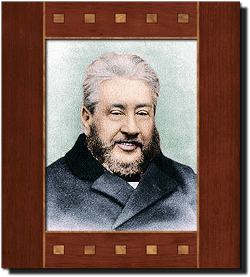 "Predestination and free agency do not agree," so the modern Solomons assert.
"Predestination and free agency do not agree," so the modern Solomons assert.








